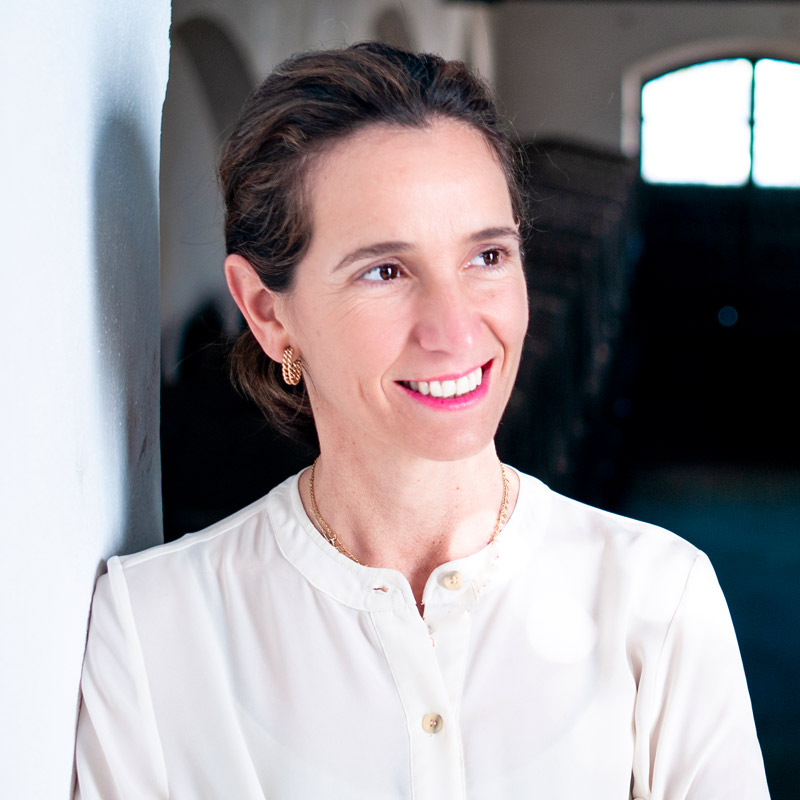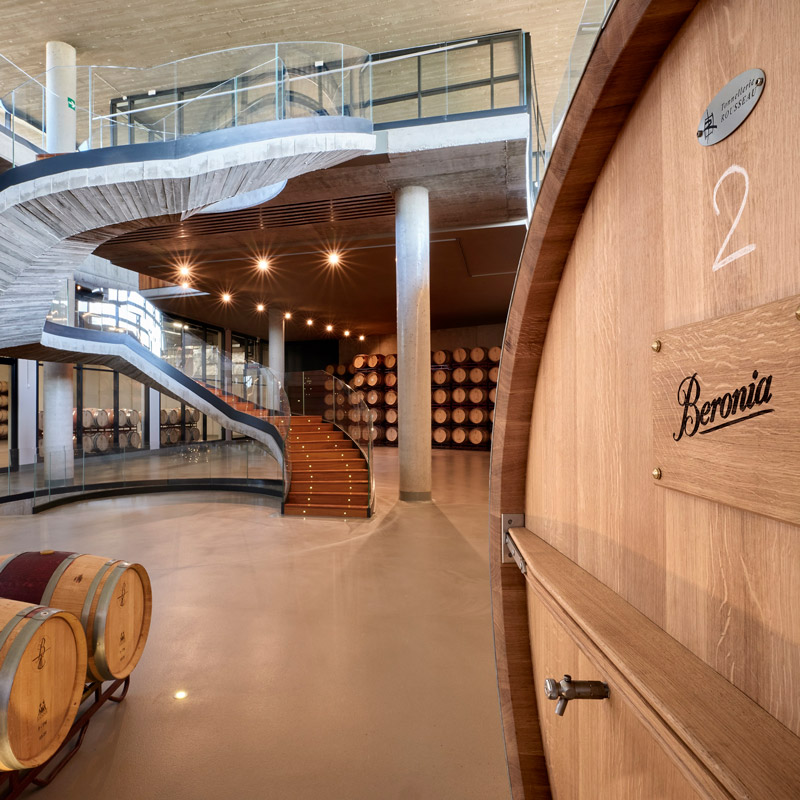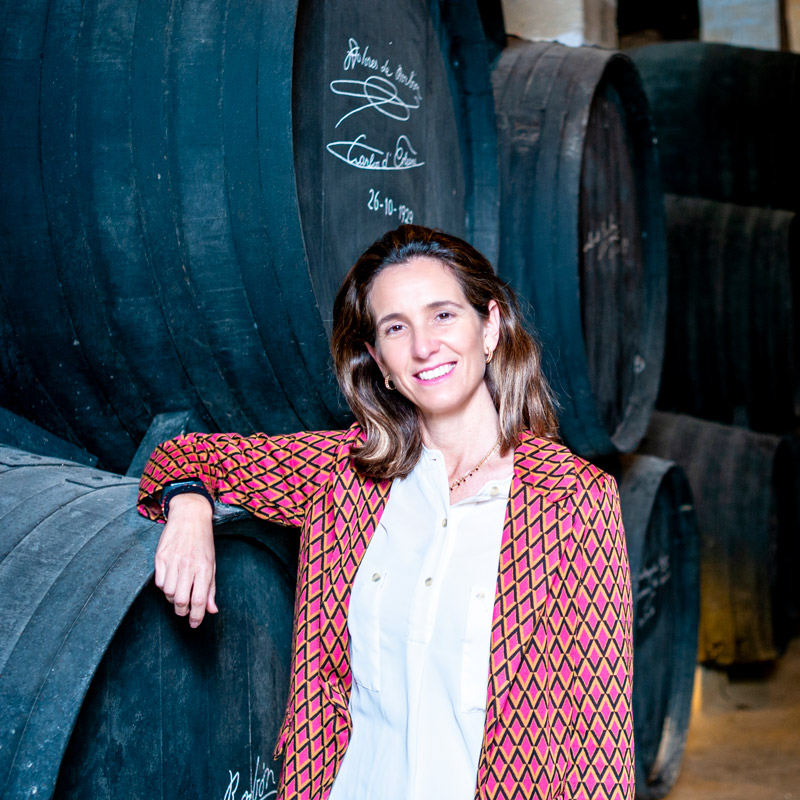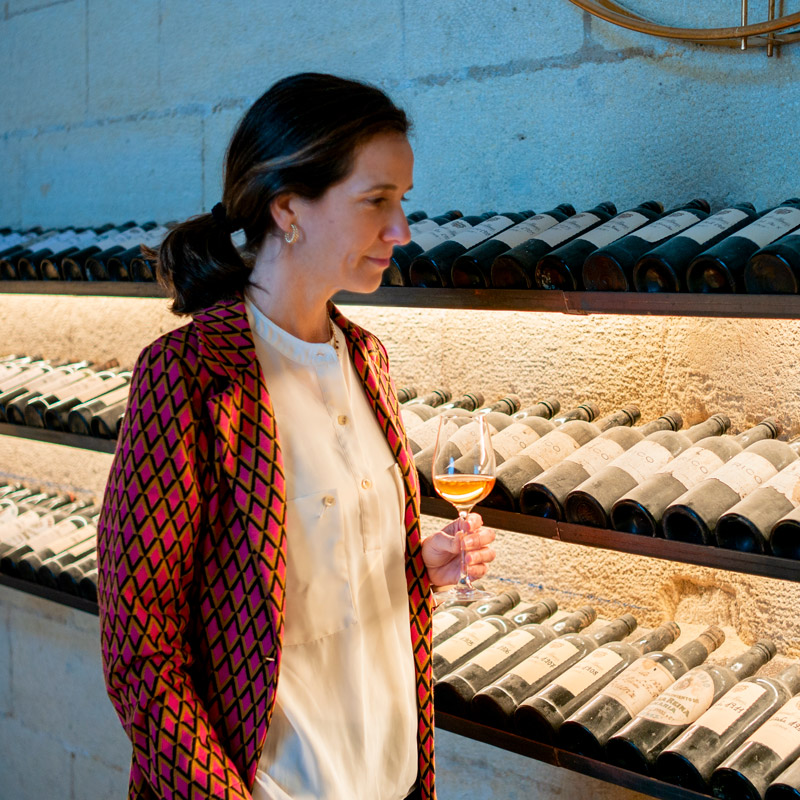 Gonzalez Byass from Jerez produces the well-known Tio Pepe sherry, and the company also owns 13 wineries in Chile and Argentina. It is fully committed to sustainable production. Uwe Kauss spoke with Vicky Gonzalez-Gordon, CEO for Sustainability, about goals, experiences and future projects.
Gonzalez Byass from Jerez produces the well-known Tio Pepe sherry, and the company also owns 13 wineries in Chile and Argentina. It is fully committed to sustainable production. Uwe Kauss spoke with Vicky Gonzalez-Gordon, CEO for Sustainability, about goals, experiences and future projects.The Spanish wine and sherry company Gonzalez Byass in Jerez produces the world-famous sherry Tio Pepe. But in addition to the sherry bodega in Jerez, the company, which was founded in 1835, now also owns 13 wineries with 2,000 hectares of vineyards in Spain, Argentina and Chile. The company, which has always been family-owned, has based its work on sustainability like few others in Europe. With the project "5+5 Care for the planet", it refers to the five generations of the family that have already run Gonzalez Byass - and the next five, to whom the current management wants to leave a future-proof environment. The wineries are currently working on concrete goals for CO2 reduction, the use of renewable energies, biodiversity in the vineyards and the use of piwis and indigenous varieties. Gonzalez Byass also initiates social projects and supports educational institutions in Spain.

Currently, there is hardly a winery that does not use the term sustainability in some way. Your family owns 14 wineries that produce wine and sherry. When did the family start thinking about the topic?
Vicky Gonzalez-Gordon: It actually goes back to our founder. Our company has existed since 1835. For example, at that time he had a school set up for the workers' children, there was a doctor for the employees. That's not unusual today, but for those times it was amazing. From the beginning, he attached great importance to quality, because he sold the wine under his name. One of his most important values was consistency, looking to the future was important for all his decisions. About five years after starting, he bought land and had vineyards planted there. This was to ensure quality in the long term. He also launched or was involved in many innovations. This has continued in the family: As early as 1955, Mauricio González-Gordon Díez opened the first private viticultural research institute, Cidima, in Spain. Since then, the letters have stood for research, quality, development, innovation and the environment. The aspects of sustainability are part of our family's DNA.
What influence does that have on your wineries today?
Vicky Gonzalez-Gordon: In 2012, we discussed these issues at length and decided to develop the sustainability programme "Five-plus-Five". It is based on the idea that our company has existed for five generations today and that we want to preserve it for the next five generations. In doing so, we include all aspects of cultivation and production. We own 2,000 hectares of vineyards in Spain, Argentina and Chile. Here, we now work with 50 percent integrated, sustainable agriculture and 20 percent organic. In all our vineyards, we only use energy from renewable sources, from solar panels and biomass. Energy efficiency is also a very important factor. Furthermore, we have significantly reduced the irrigation of the vines and installed closed cycles so that as little water as possible is wasted.
You produce large quantities of sherry for worldwide distribution. How do you combine the fight for price points with your strategy?
Vicky Gonzalez-Gordon: We recently opened a new winery in Beronia. Already in the planning stage, we have significantly optimised very many parts of the production. That's what it's all about: We are now achieving much greater efficiency in production there. We use new technologies, optimise processes - and our people can work better and more relaxed as a result. It's about striking the right balance.

You have gained a lot of experience with the 14 wineries by now. Which projects have not worked out?
Vicky Gonzalez-Gordon: I can't tell you about any project that didn't work. The most difficult thing is to question the whole path from grape to bottle in all teams. The marketing people perceive our products from our customers' point of view. The teams working in the vineyards, on the other hand, want to work sustainably above all. Here, too, we have to find the right balance. That means we have a lot of discussions. We also work with very different people. Some of our vineyards are organic, like Veramonte in Chile. Others are still in the process of conversion. For some of them, the climatic conditions are excellent, so it's very easy there. But for some of our other estates it is not at all. But for me, organic farming is not synonymous with sustainable practices. It is only one part of it.
If the owner of a winery were to ask you: We want to work in the future consistently sustainably. What first steps would you recommend?
Vicky Gonzalez-Gordon: The most important aspect of winemaking is water. It is one of the biggest problems globally. The vines need enough water, we need it in the cellar as well. My first tip would be to be very careful when you irrigate. Really only give them as much as they really need. If your vineyards are already green, make sure you have enough biodiversity. But don't set your ambitions too high. The wine industry is not the biggest problem in terms of global emissions. Nevertheless, it is important to question every step of production. For example, we almost don't waste water in the vineyard anymore, we catch it and reuse it. We also ask our distributors what we can do better. It's always about involving all parts of the business.
What specific goals are you currently pursuing?
Vicky Gonzalez-Gordon: I want my children to be able to continue this business in the future. That's why we have to protect our foundation, the vineyards. That is why we will work on our four goals. Firstly, training: We are constantly training our teams. To this end, we have set up an orchard project where villagers learn to grow their own fruit and vegetables again. Secondly, we want to reduce our energy consumption by 55 percent by 2030. Thirdly, we are re-cultivating abandoned vineyards with historic grape varieties in various projects. In addition, we are helping farmers throughout Spain not to abandon their small vineyards, but to cultivate them anew. Fourthly, we want to help with many projects to improve biodiversity on as many areas as possible. Our wineries are already very active in this regard.

Wine companies like Miguel Torres, for example, also have a climate protection and sustainability strategy like yours. Do you exchange experiences?
Vicky Gonzalez-Gordon: There are several projects with a very long duration that we are tackling with partners. These include wineries, other companies from the wine industry, but also universities. We participate in their studies, for example, on the adaptation of processes in wine production or on the better protection of landscapes. Together with wineries, we work primarily on certification systems, concrete projects for climate protection and methods for more sustainability. In addition, there are projects for better social cohesion.
Since we have been talking about climate protection and sustainability, there has been a completely new culture of cooperation and open exchange in the wine scene - even beyond the boundaries of competition.
Vicky Gonzalez-Gordon: Yes, a lot has changed there. Many wineries are now along the same lines as we are. We exchange experiences intensively, share our knowledge and often take part in forums and discussions. After all, we have to work together with other wineries towards a common goal. We don't just want to sell wine, we are interested in more.
What exactly?
Vicky Gonzalez-Gordon: We want people to feel connected to our wines. We want our customers to build a relationship with the winery. It is not enough to say that our wine brands are sustainable. I want them to have trust in the people who produce it. The term sustainability is only one part of the whole. Because customers know more and more about it.